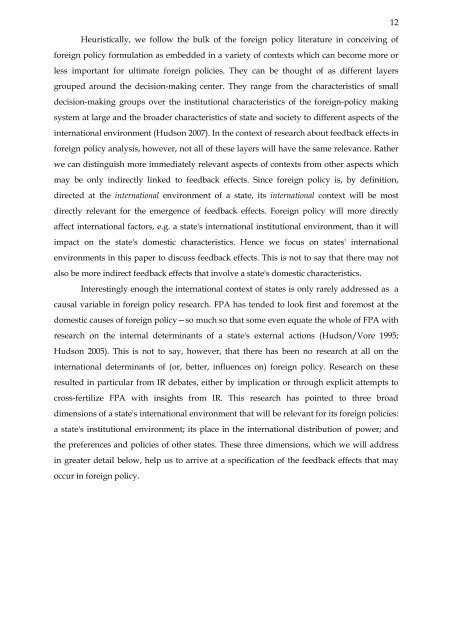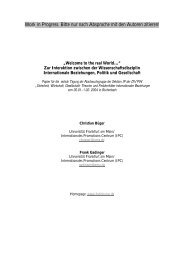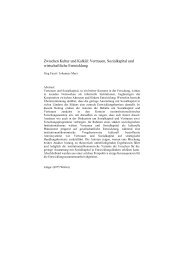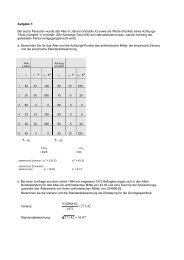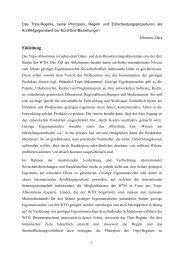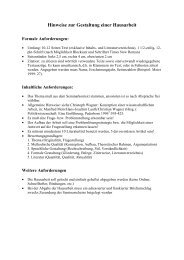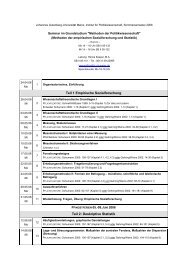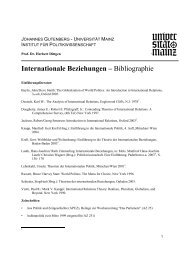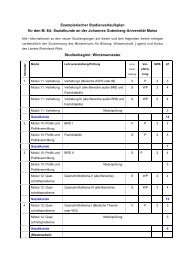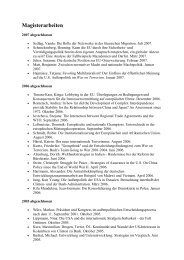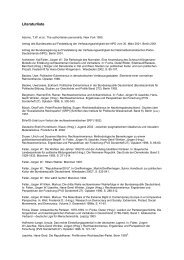Feedback Effects in Foreign Policy: A Framework for Analysis
Feedback Effects in Foreign Policy: A Framework for Analysis
Feedback Effects in Foreign Policy: A Framework for Analysis
Create successful ePaper yourself
Turn your PDF publications into a flip-book with our unique Google optimized e-Paper software.
12<br />
Heuristically, we follow the bulk of the <strong>for</strong>eign policy literature <strong>in</strong> conceiv<strong>in</strong>g of<br />
<strong>for</strong>eign policy <strong>for</strong>mulation as embedded <strong>in</strong> a variety of contexts which can become more or<br />
less important <strong>for</strong> ultimate <strong>for</strong>eign policies. They can be thought of as different layers<br />
grouped around the decision-mak<strong>in</strong>g center. They range from the characteristics of small<br />
decision-mak<strong>in</strong>g groups over the <strong>in</strong>stitutional characteristics of the <strong>for</strong>eign-policy mak<strong>in</strong>g<br />
system at large and the broader characteristics of state and society to different aspects of the<br />
<strong>in</strong>ternational environment (Hudson 2007). In the context of research about feedback effects <strong>in</strong><br />
<strong>for</strong>eign policy analysis, however, not all of these layers will have the same relevance. Rather<br />
we can dist<strong>in</strong>guish more immediately relevant aspects of contexts from other aspects which<br />
may be only <strong>in</strong>directly l<strong>in</strong>ked to feedback effects. S<strong>in</strong>ce <strong>for</strong>eign policy is, by def<strong>in</strong>ition,<br />
directed at the <strong>in</strong>ternational environment of a state, its <strong>in</strong>ternational context will be most<br />
directly relevant <strong>for</strong> the emergence of feedback effects. <strong>Foreign</strong> policy will more directly<br />
affect <strong>in</strong>ternational factors, e.g. a state's <strong>in</strong>ternational <strong>in</strong>stitutional environment, than it will<br />
impact on the state's domestic characteristics. Hence we focus on states' <strong>in</strong>ternational<br />
environments <strong>in</strong> this paper to discuss feedback effects. This is not to say that there may not<br />
also be more <strong>in</strong>direct feedback effects that <strong>in</strong>volve a state's domestic characteristics.<br />
Interest<strong>in</strong>gly enough the <strong>in</strong>ternational context of states is only rarely addressed as a<br />
causal variable <strong>in</strong> <strong>for</strong>eign policy research. FPA has tended to look first and <strong>for</strong>emost at the<br />
domestic causes of <strong>for</strong>eign policy—so much so that some even equate the whole of FPA with<br />
research on the <strong>in</strong>ternal determ<strong>in</strong>ants of a state's external actions (Hudson/Vore 1995;<br />
Hudson 2005). This is not to say, however, that there has been no research at all on the<br />
<strong>in</strong>ternational determ<strong>in</strong>ants of (or, better, <strong>in</strong>fluences on) <strong>for</strong>eign policy. Research on these<br />
resulted <strong>in</strong> particular from IR debates, either by implication or through explicit attempts to<br />
cross-fertilize FPA with <strong>in</strong>sights from IR. This research has po<strong>in</strong>ted to three broad<br />
dimensions of a state's <strong>in</strong>ternational environment that will be relevant <strong>for</strong> its <strong>for</strong>eign policies:<br />
a state's <strong>in</strong>stitutional environment; its place <strong>in</strong> the <strong>in</strong>ternational distribution of power; and<br />
the preferences and policies of other states. These three dimensions, which we will address<br />
<strong>in</strong> greater detail below, help us to arrive at a specification of the feedback effects that may<br />
occur <strong>in</strong> <strong>for</strong>eign policy.


